You’re searching for “Selenium alternatives” because, while Selenium is a popular open-source test automation tool, it has certain limitations.
Its slow execution speed can be problematic when dealing with large test suites or complex applications. The basic reporting and analytics features make finding problems and testing results difficult. It also lacks a mobile app testing focus — an essential feature for most organizations.
Organizations want a powerful, efficient, easy-to-use test automation tool that streamlines testing and provides a seamless experience. For effective reporting and analytics, you’ll need a third-party tool.
This article will explore the top 7 selenium alternatives, their features, and why people use the Selenium framework.
Table of Contents
- 1. Ghost Inspector
- 2. Cypress
- 3. Puppeteer
- 4. Playwright
- 5. Cucumber
- 6. Katalon
- 7. NightwatchJS
- Why do people use the Selenium web testing framework?
- The pros and cons of Selenium test automation
- FAQ Selenium alternatives
- Ghost Inspector: The best Selenium alternative for developers and testers
Automate web testing the easy way
with Ghost Inspector
Our 14 day free trial gives you and your team full access. Create tests in minutes. No credit card required.
This first on our list of Selenium alternatives is Ghost Inspector. It’s a cloud-based test automation solution designed to help businesses ship high-quality software faster. It provides a complete solution for creating, executing, and maintaining automated tests for websites and web applications.
Ghost Inspector’s core features
- Codeless test editor: Ghost Inspector’s codeless editor allows you to build resilient, data-driven test workflows with AI-assisted selectors. It abstracts away code to let anyone create robust tests that reliably exercise every part of your application.
- Visual testing: This ensures your application looks great on all major browsers, such as Chrome, Firefox, Safari, Edge, and even the legacy IE11. Ghost Inspector handles these tests to make sure your app looks consistent everywhere. Unlike Selenium, which lacks this feature, Ghost Inspector has you covered. It can run visual tests to ensure your application renders correctly across browsers.
- Web test recorder: Its intuitive web test recorder lets you simply click through your application to record test steps. Ghost Inspector captures your actions and turns them into a reusable, automatable test script as you navigate workflows. This makes test creation easy for anyone, whether you’re a developer, QA professional, or someone without a technical background.
- Parallelized test execution: Tests can be run parallel across multiple browser/OS configurations for fast feedback. This maximizes testing throughput so you can catch issues earlier and release them with confidence.
You can sign up for a free trial or schedule a personalized demo to get started. Keep reading to learn more about what makes Ghost Inspector unique.
Pros of Ghost Inspector
- Accessibility testing to ensure your apps meet accessibility standards
- Browsers, Screens & Geolocations to test across different browsers, devices, and locations
- Email testing to validate email workflows
- Advanced scheduling to run tests on repeating schedules
- API & Third Party Integrations for connecting to your existing tools
What our customers are saying about us
“Incredible product”

“Fantastic Automation Tool”

2. Cypress
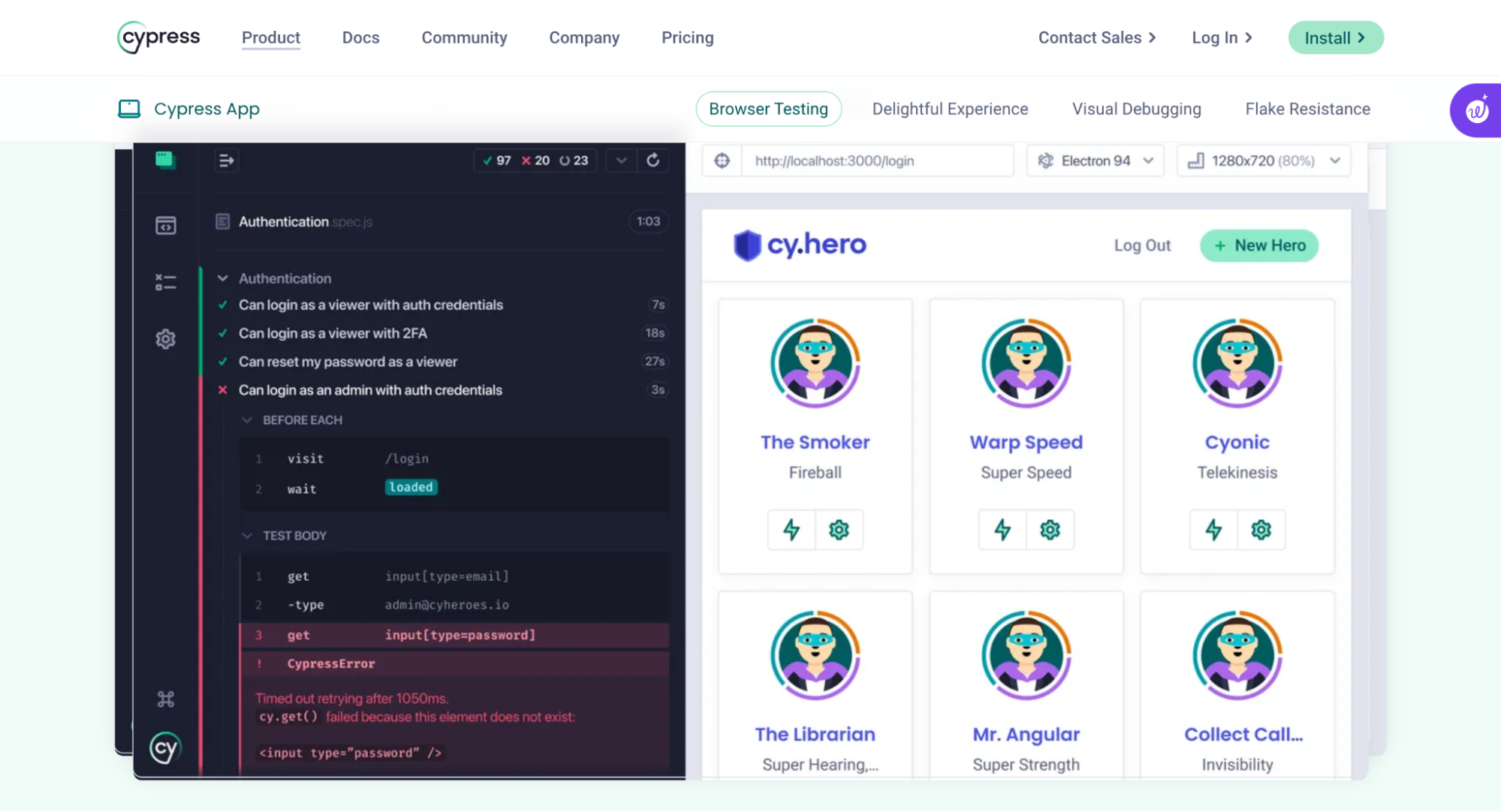
Cypress is a modern, JavaScript-based end-to-end testing framework that executes tests directly in the browser, offering a faster and more developer-friendly alternative to Selenium. Unlike general-purpose automation or unit testing tools, Cypress’s architecture provides real-time reloading, time travel debugging, and native access to browser APIs, making it a preferred choice for modern web application testing.
Features
- Direct browser debugging: Debug and fix failed tests directly in the browser using Cypress’s built-in developer tools.
- Test isolation: Each test runs independently to prevent interference, ensuring reliable and reviewable results.
- Time travel: View snapshots of your application at each step of a test to understand exactly what happened and when.
- Real-time reloads: Automatically reloads the test runner whenever you save changes to your test files, streamlining the development workflow.
3. Puppeteer
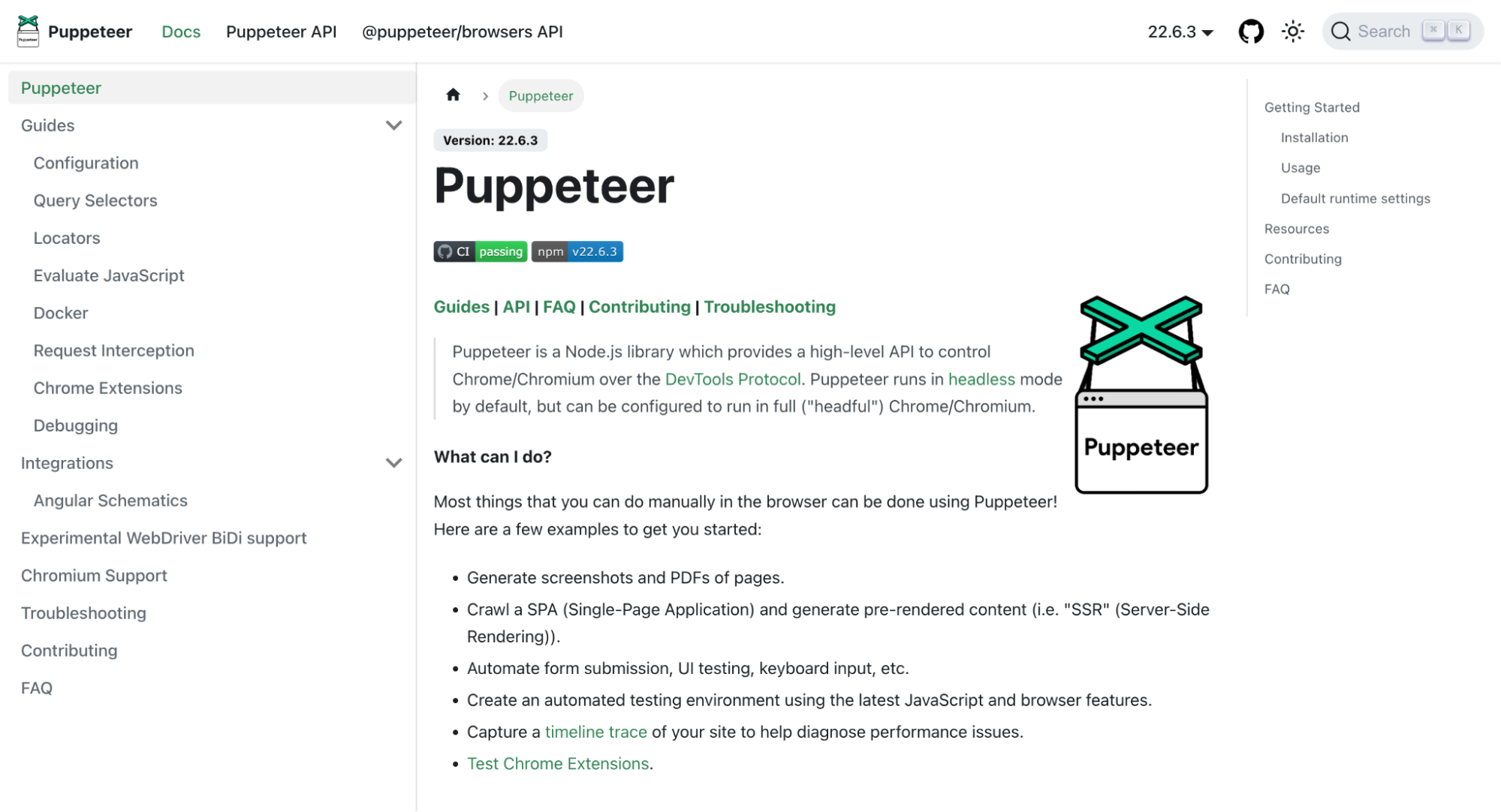
Puppeteer is an open-source browser testing tool built on the Node.Js library. It’s An API-based tool that allows testing apps from the command line in Chrome or Chromium. Puppeteer provides a faster alternative to other testing tools because it uses a headless platform that requires no extra UI for testing, making it a compelling choice for efficient web automation testing.
Features
- Automated form submissions: Automate filling out and submitting forms on web pages.
- Image and PDF generation: Capture screenshots and generate PDF reports for visual validation.
- Code coverage collection: Collect JavaScript and CSS coverage data to create detailed reports.
4. Playwright
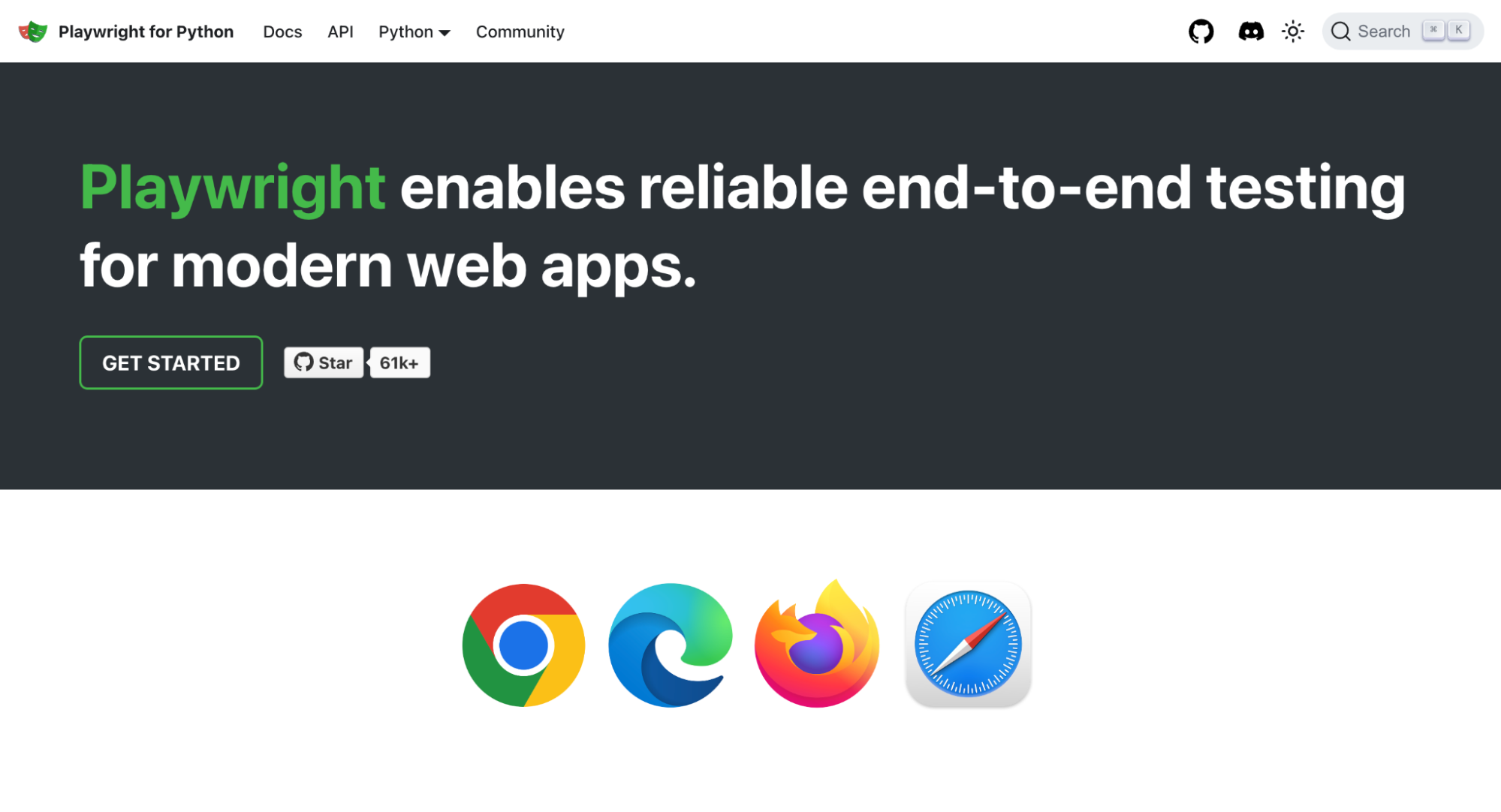
This is another NodeJS web testing library built by the Microsoft team that provides a cross-browser testing experience. Playwright is compatible with browsers like Edge, Firefox, and Chrome. It uses a headless browser to carry out automated tests controlled from the command line.
Features
- Multiple language support: Support testing web applications built in various programming languages without requiring developers or testers to learn a specific one.
- Auto-waiting and retry mechanisms: Wait for elements to be ready and automatically retry actions during network instability to reduce test failures.
- Debugging tools: Navigate tests, edit locators in real time, and view actionable logs for easier troubleshooting.
5. Cucumber

Cucumber is a Ruby-based web testing tool that uses Behavior-Driven Development (BDD) in web projects. Instead of programming languages, Cucumber uses a human-readable format called Gherkin, which is accessible to technical and non-technical stakeholders, making it an attractive choice for web testing.
Features
- Tags: Testers can specify which features in a feature file to test at particular points in time.
- Cross-platform support: Cucumber supports a wide range of programming languages and platforms such as Java, JavaScript, PHP, Python, etc..
- Living documentation: Cucumber’s Gherkin scenarios serve as living documentation for the application under test.
- Reporting and analysis: Cucumber provides detailed reports and analysis tools for test execution.
6. Katalon
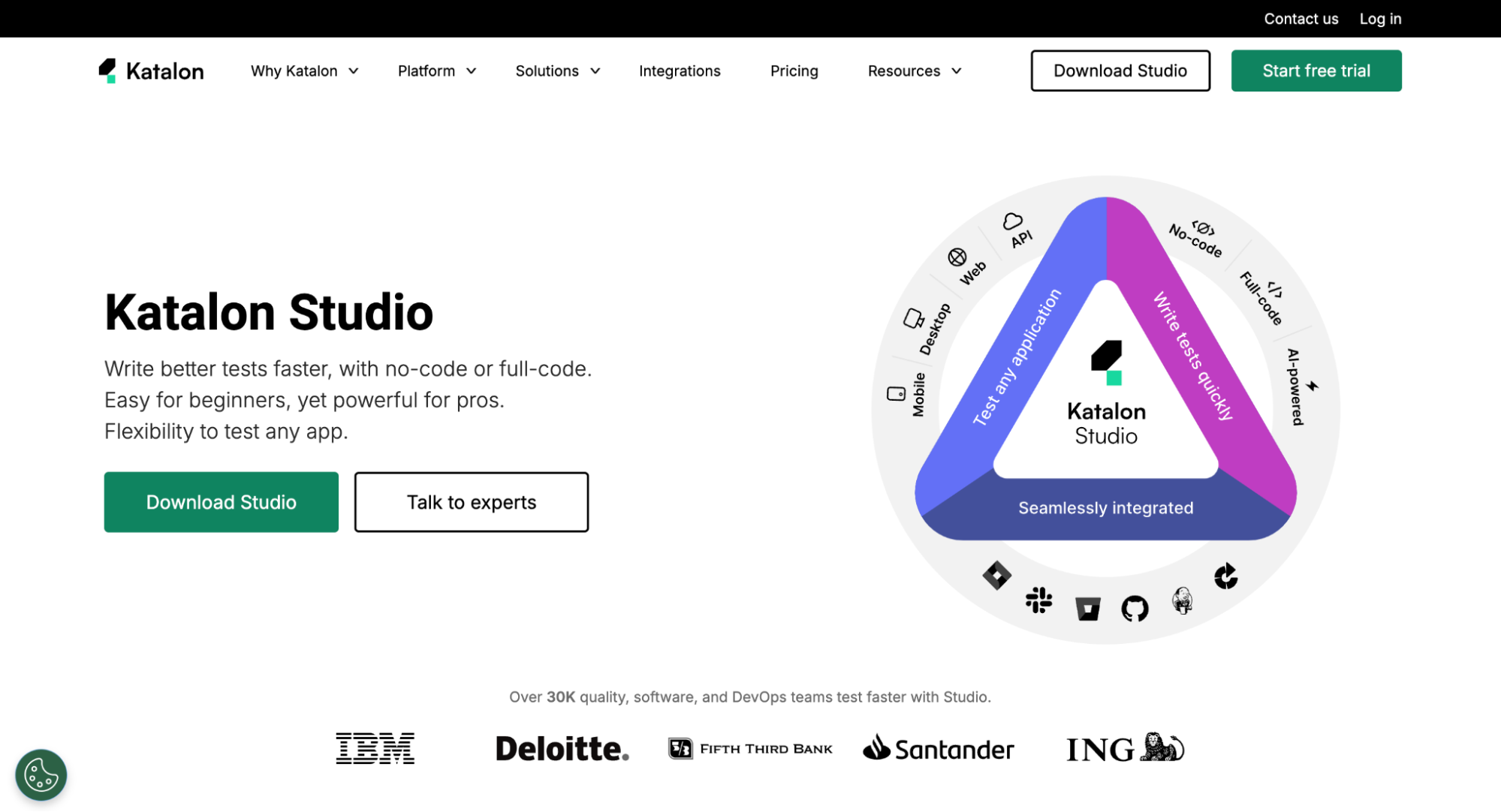
An all-in-one web testing automation tool for various web, desktop, and mobile platforms. Katalon is designed for both beginners and pros. It incorporates AI in web testing, which provides a faster approach to web testing. Katalon integrates with popular tools like JIRA, qTest, and Jenkins.
Features
- AI visual testing: It uses AI-powered visual testing to detect disparities between images without extra tests and effort.
- User-friendly UI: Katalon Studio provides a user and beginner-friendly UI. This allows testers to get started with testing regardless of their technical ability.
- Codeless and scripted testing: Katalon supports codeless and scripted testing approaches.
- Test case management: Katalon provides built-in test case management capabilities for organizing and maintaining tests.
7. NightwatchJS
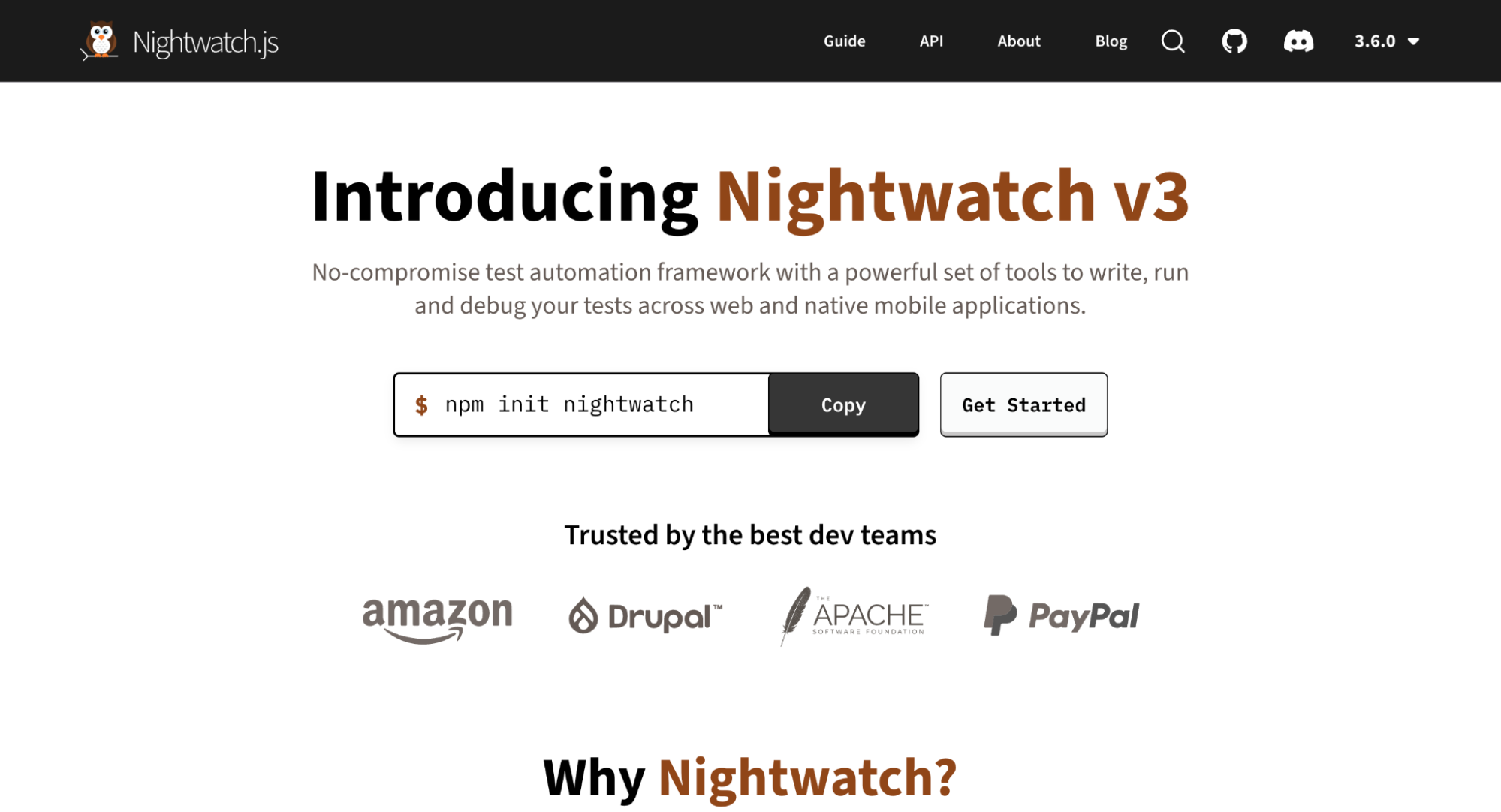
Nightwatch.js is an open-source web testing tool built on the Nodejs library. It offers end-to-end testing across different web platforms and native mobile apps. Nightwatch is configured with the W3C web driver API that allows for user and browser communication.
Features
- Go beyond end-to-end (E2E) testing: It can perform unit tests, integration tests, and API tests in addition to traditional E2E tests.
- Developer experience: Nightwatchjs supports complex testing and debugging from the smallest pixel to multiple tabs and pages without friction.
- Continuous integration: It integrates with third-party tools and libraries that help in continuous development and building. This ensures that the product does not break at any point and developers continuously update tests.
Why do people use the Selenium web testing framework?
Despite the emergence of newer tools, Selenium continues to be a popular choice for the following reasons:
- Selenium is an open-source tool that is free for everyone and can be customized to meet specific individual needs. It has a developers’ community that can assist users with difficulties.
- Parallel execution in Selenium helps save time when you execute multiple tests simultaneously. This also allows you to test various browsers in parallel using the cross-browser cloud rates.
- Selenium supports many languages. It lets developers of different language backgrounds use the tool. They can write testing scripts in any language, and the tool converts the scripts to Selenium scripts.
The pros and cons of Selenium test automation
Pros:
- CI/CD integration: Selenium is fully integrated with Azure, Circle CI, and GitLab tools. It ensures seamless, continuous integration and delivery and stops breakage in development and testing.
- Multiple browsers and system support: Allows rigorous testing across many platforms.
- Integrates with many plugins and extensions to provide more customization. These extensions help improve users’ productivity and tool functionality.
Cons:
- Steep learning curve for complex testing scenarios
- Requires additional setup and configuration
- Performance can be slower than alternatives.
- Selenium lacks built-in image comparison: This gap limits image verification and pixel testing.
- Absence of automatic report generation: Testers have to go through the stress of manually taking screenshots of points of failure.
FAQ Selenium alternatives
Testers, companies, and developers often have important questions about Selenium alternatives. That’s because selecting the right testing platform is paramount to a successful testing workflow. Below, we’ve compiled some of the most common questions about alternatives to Selenium testing.
Is there a better alternative to Selenium?
Working with Selenium can be great, as it has many functions. However, its downsides can be a big turnoff. To overcome this, tools like Ghost Inspector, Puppeteer, and Cypress can work as alternatives to Selenium. These tools offer several advantages over Selenium, such as faster execution times, more efficient browser interactions, and intuitive API, making it easier for developers to write and maintain test scripts.
Is Selenium becoming obsolete?
No, Selenium is still a widely used software testing tool. It’s not going obsolete anytime soon, largely because it’s open-source. Developers also continue to improve on its weaknesses.
What tool is faster than Selenium?
Ghost Inspector, Puppeteer, Playwright, Cypress, Katalon are all faster than Selenium in terms of executions.
Ghost Inspector: The best Selenium alternative for developers and testers
Selenium is a popular choice, but its limitations give users no choice but to try various alternatives that address their testing needs. Each of these alternatives has pros and cons.
To ensure the quality and functionality of web and mobile apps, a robust and reliable testing framework is essential. This is why Ghost Inspector is the Selenium alternative of choice for testers and developers.
Interested in experiencing the power and simplicity of Ghost Inspector’s codeless test automation firsthand? Book a personalized demonstration call with our experts today.
Automate web testing the easy way
with Ghost Inspector
Our 14 day free trial gives you and your team full access. Create tests in minutes. No credit card required.


